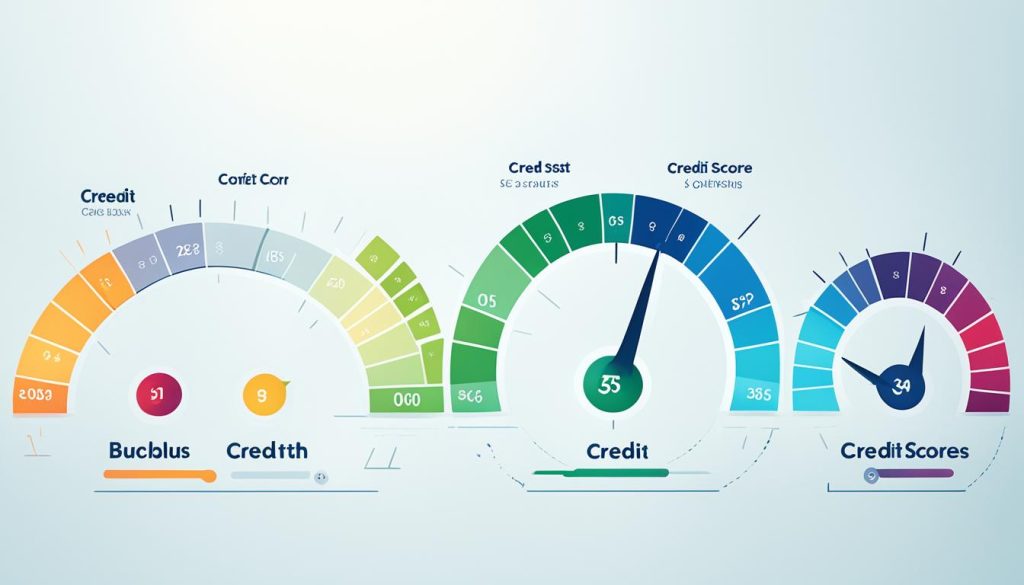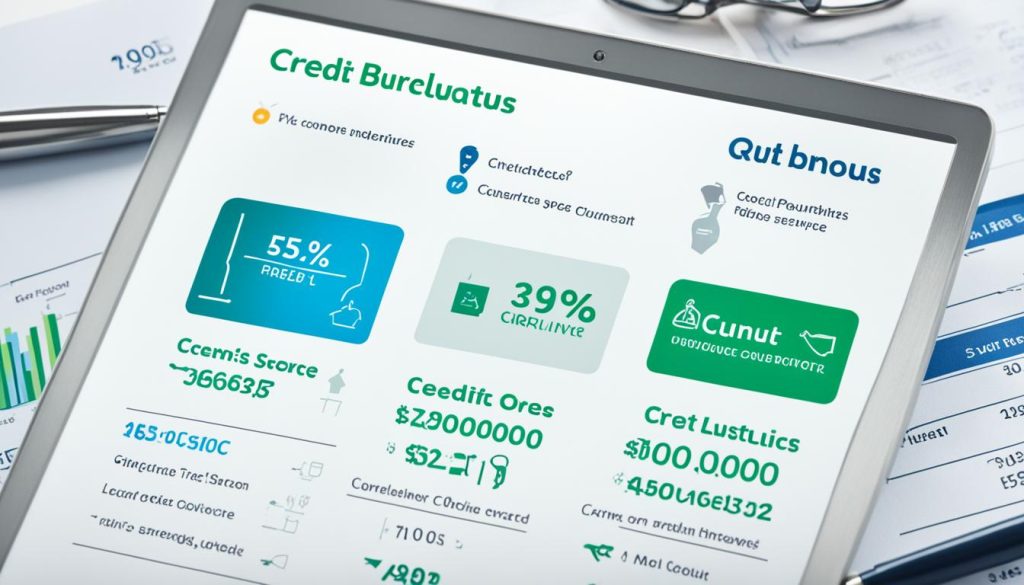When it comes to your financial well-being, understanding all 3 credit reports is essential. Equifax, TransUnion, and Experian are the three major credit bureaus in the U.S. Each of them generates their own credit report, which means you may have three different reports with your name. These reports provide a detailed breakdown of your credit history, including your credit activity, account status, payment history, debt collections, and more. By obtaining reports from all credit bureaus, you can gain a complete understanding of your financial standing.
Obtaining these comprehensive credit reports is easier than you might think. You can request them for free once a year from each credit bureau, giving you the opportunity to assess your financial health regularly. You can directly request the reports from the bureaus themselves or go through your bank to access them. The reports are compiled using information from various sources, such as credit issuers, banks, public records, and more, ensuring that you have a comprehensive view of your credit history.
Credit bureaus use different scoring models, such as FICO and VantageScore, to calculate credit scores. While all three credit bureaus are widely used and offer valuable information, it’s important to note that each bureau has its own credit score range and weightings for different factors. Understanding these differences can empower you to make informed financial decisions based on the most accurate information.
Key Takeaways:
- There are three major credit bureaus in the U.S. – Equifax, TransUnion, and Experian.
- Each credit bureau issues its own credit report, so there can be three different reports with your name.
- You can obtain free credit reports from each credit bureau once a year.
- These reports provide a comprehensive overview of your credit activity, account status, payment history, and more.
- Understanding the differences between credit bureaus and their scoring models is crucial for making informed financial decisions.
What are Credit Bureaus and What Do They Do?
Credit bureaus, also known as credit reporting agencies, play a crucial role in the financial world. These companies specialize in collecting and storing information about individuals’ credit accounts and history from various sources, such as credit issuers, banks, and public records.
Using this gathered data, credit bureaus generate comprehensive reports that provide detailed insights into an individual’s credit activity, account status, payment history, debt collections, bankruptcies, and account dates. These credit reports serve as a snapshot of an individual’s financial health and creditworthiness.
One of the primary functions of credit bureaus is to calculate credit scores. Credit scores, such as the widely used FICO and VantageScore models, are numerical representations of an individual’s creditworthiness. These scores take into account factors like payment history, amounts owed, credit age, new credit, and credit mix. By using different weightings for these factors, credit bureaus generate credit scores that help lenders and financial institutions assess an individual’s creditworthiness and make informed lending decisions.
In the United States, the three major credit bureaus are Equifax, Experian, and TransUnion. These bureaus have established themselves as industry leaders, providing reliable and accurate credit reporting services. While they share similar goals of providing valuable credit information, each credit bureau has its own unique methodologies and scoring models.
An Example of How Information is Gathered and Reported by Credit Bureaus:
“Imagine that Jane, a responsible credit user, has a credit card with Bank A and a personal loan from Bank B. Both banks report her payment history and account activity to the credit bureaus, such as the amount she owes, repayment patterns, and any late or missed payments. In addition, if Jane were to file for bankruptcy or have a debt collection account, this information would also be included in her credit report. Credit bureaus receive this data and incorporate it into the credit reports they generate for Jane. Based on the information, the credit bureaus use their respective scoring models, like FICO or VantageScore, to calculate her credit score.”
Why Credit Bureaus are Essential:
Credit bureaus play a vital role in the financial landscape by providing individuals and lenders with crucial credit information. They enable lenders to assess an individual’s creditworthiness and make informed decisions about extending credit. Likewise, individuals can utilize their credit reports and scores to understand their financial standing, identify areas for improvement, and make educated financial choices.
| Credit Bureaus | Key Functions |
|---|---|
| Equifax | Provides comprehensive credit reports and credit scores using a range of 280-850. |
| Experian | Offers credit reports that include rental payment data and utilizes a scoring model that weighs different credit factors. |
| TransUnion | Weighs payment history and credit age heavily, using its own scoring model to calculate credit scores. |
Despite the differences among credit bureaus, it’s important to note that there is no single “better” or “more accurate” credit bureau. Each bureau has its own unique methodologies and scoring models, resulting in variations in credit scores. Therefore, it is crucial for individuals to obtain reports from all three major credit bureaus to gain a comprehensive understanding of their credit profiles.
Next, we will explore the differences among Equifax, Experian, and TransUnion in greater detail and delve into how these distinctions can impact your credit assessment.
The Differences Between Credit Bureaus
While Equifax, Experian, and TransUnion are all credit bureaus that collect similar information and provide similar services, there are differences between them. Understanding these differences can help you gain a better understanding of your credit report and score breakdown.
Equifax
Equifax is one of the major credit bureaus in the United States. It uses a credit score range of 280-850 and considers various credit factors when calculating scores. Equifax weighs factors such as payment history, credit age, and credit utilization. By analyzing these factors, Equifax provides a comprehensive credit report breakdown to individuals seeking detailed credit information.
Experian
Experian is the largest credit bureau and is known for collecting rental payment data in addition to other credit information. This additional data can provide a more comprehensive view of an individual’s financial history. Experian’s credit scoring model also takes into account various credit factors, including payment history, credit utilization, and credit mix. This comprehensive approach enables Experian to provide individuals with a thorough credit report breakdown.
TransUnion
TransUnion, another major credit bureau, emphasizes payment history and credit age in its credit scoring model. These factors play a vital role in determining an individual’s creditworthiness. TransUnion gathers information from various sources to provide a comprehensive credit report breakdown, enabling individuals to assess their creditworthiness more effectively.
Each credit bureau has its own breakdown of credit factors and credit score range, meaning your credit scores may vary between bureaus. It’s important to note that one credit bureau is not more accurate or important than another. Differences in methodologies and data sources can result in variations in credit scores. Nonetheless, all three credit bureaus are widely used and provide valuable information for making financial decisions.
To get a comprehensive overview of your credit profile, it’s recommended to check your credit reports from Equifax, Experian, and TransUnion regularly. With a thorough understanding of your credit report breakdown and credit score range, you can make informed financial decisions and work towards improving your creditworthiness.
How to Check Your Credit Reports and Dispute Inaccurate Information
Regularly checking your credit reports is essential to ensure their accuracy and completeness. By reviewing your credit reports, you can get valuable insights into your credit history, including personal information, credit accounts, collections, bankruptcies, and credit inquiries.
To obtain your credit reports, you can request them for free once a year from each of the three major credit bureaus through AnnualCreditReport.com. Additionally, you can access your credit reports for free on platforms like Credit Karma.
Here are the steps to check your credit reports and dispute any inaccurate information you may find:
- Obtain your credit reports: Visit AnnualCreditReport.com or Credit Karma and follow the instructions to access your credit reports from Equifax, Experian, and TransUnion.
- Review your credit reports: Carefully examine each section of your credit reports, paying close attention to personal information, credit accounts, collections, bankruptcies, and credit inquiries. Look for any discrepancies, inaccuracies, or incomplete information.
- Dispute inaccurate information: If you identify any inaccurate or incomplete information on your credit reports, you have the right to dispute it. Contact the credit bureau or the company that provided the information and inform them of the inaccuracies. You can dispute the information online, by phone, or by mail.
Note: It’s important to keep copies of any supporting documents or evidence related to the disputed information. This can help strengthen your case and expedite the resolution process.
“Regularly checking your credit reports allows you to monitor your credit history, detect errors, and maintain a healthy credit profile.”
Disputing inaccurate information on your credit reports can take time, but it’s a crucial step in ensuring the accuracy of your credit history. Once you’ve filed a dispute, the credit bureau or the company reporting the information has a specified period to investigate and respond to your dispute.
Monitoring your credit reports and taking action to correct any errors or fraudulent activity can play a key role in maintaining a strong credit standing. By staying vigilant and addressing inaccuracies promptly, you can protect yourself from potential credit problems and make informed financial decisions.
| Credit Report Check and Dispute Checklist | Description |
|---|---|
| Obtain your credit reports | Access your credit reports from Equifax, Experian, and TransUnion through AnnualCreditReport.com or Credit Karma. |
| Review your credit reports | Thoroughly examine your credit reports for any discrepancies, inaccuracies, or incomplete information. |
| Dispute inaccurate information | Contact the credit bureau or the company reporting the information to dispute any inaccuracies, providing supporting documents if necessary. |
| Monitor the dispute progress | Keep track of the dispute process and follow up with the credit bureau or company as needed. |
Why Credit Scores Vary Across Credit Bureaus
Credit scores can vary across credit bureaus due to several reasons. First, not all creditors report information to all three bureaus, so the data used to calculate scores may be different. Additionally, credit scoring models, such as FICO and VantageScore, may have different weightings for the factors they consider. For example, one scoring model may prioritize payment history more than another. Furthermore, lenders may use different scoring models or request scores from specific bureaus. These variations can result in different credit scores from each bureau. It’s important to understand that these variations are normal and not an indication of errors or inaccuracies.

Credit Score Variations
To better understand why credit scores differ across bureaus, consider the following factors:
- Data Variations: Not all creditors report information to all three credit bureaus. This means that each bureau may have different data included in their credit reports. For example, one bureau may have information about a particular credit account that the others do not.
- Scoring Model Differences: Credit bureaus use various scoring models, such as FICO and VantageScore, to calculate credit scores. These models may have different weightings for factors such as payment history, credit utilization, length of credit history, and more.
- Lender Preferences: Lenders can choose which credit bureau’s score they want to consider when making lending decisions. Some lenders may have a preference for one scoring model or bureau over another. This can result in different credit scores being used for different loan applications.
It’s important to keep in mind that while credit scores may vary across bureaus, they are all derived from the same underlying credit information. Variations in credit scores do not necessarily indicate inaccuracies or errors in the credit reporting process. Instead, they reflect the different methodologies and data variations among the credit bureaus.
Comparison of Credit Scores
| Credit Bureaus | Credit Score Range | Main Scoring Factors |
|---|---|---|
| Equifax | 280-850 | Payment history, amounts owed, length of credit history, new credit, credit mix |
| Experian | 300-850 | Payment history, credit utilization, length of credit history, new credit, credit mix |
| TransUnion | 300-850 | Payment history, credit utilization, length of credit history, new credit, credit mix |
As shown in the table, each credit bureau may have a slightly different credit score range and place varying emphasis on different factors when calculating scores. However, the overall goal of credit scoring is to assess an individual’s creditworthiness based on their credit history and financial behavior.
Other Important Credit Bureaus
In addition to the well-known credit bureaus Equifax, Experian, and TransUnion, there are several other essential credit bureaus that specialize in specific types of information. These additional credit bureaus play a crucial role in providing valuable data for specific industries, influencing lending decisions and insurance premiums.
ChexSystems is a credit bureau that focuses on collecting and reporting information related to closed checking and savings accounts. Financial institutions and credit unions use ChexSystems to assess the risk associated with opening new accounts. This bureau’s data helps them identify individuals with a history of account mismanagement or fraudulent activity.
An additional credit bureau that holds significance in specific industries is the National Consumer Telecom and Utilities Exchange (NCTUE). While Equifax, Experian, and TransUnion primarily focus on credit-related data, the NCTUE specializes in the telecommunications, pay TV, and utility industries. It collects and provides information on customer payment history and usage patterns. This data is utilized by these specific industries to make more informed decisions.
C.L.U.E. (Comprehensive Loss Underwriting Exchange), owned by LexisNexis, is another vital credit bureau that doesn’t particularly focus on credit reports. Instead, it gathers insurance-related information, such as claims history and loss-related data. Insurance companies utilize C.L.U.E. to assess an individual’s or property’s risk, helping them determine appropriate premiums and coverage.

These additional credit bureaus provide valuable and industry-specific data, enhancing the accuracy and completeness of the overall credit reporting system. They play a significant role in shaping financial institutions’ lending decisions and insurance companies’ underwriting processes.
| Credit Bureau | Specialty |
|---|---|
| ChexSystems | Closed checking and savings accounts |
| National Consumer Telecom and Utilities Exchange (NCTUE) | Telecommunications, pay TV, and utilities industries |
| C.L.U.E. (Comprehensive Loss Underwriting Exchange) | Insurance-related information |
Conclusion
Understanding the importance of credit reports and the role of credit bureaus is vital when making financial decisions. Equifax, Experian, and TransUnion are the three major credit bureaus in the U.S. that collect and analyze data to create comprehensive credit reports. While each credit bureau may use different scoring models and weigh factors differently, all three provide valuable information and tools to individuals.
Regularly checking your credit reports from all three bureaus, disputing any inaccuracies, and staying aware of your credit history are essential steps in maintaining a healthy credit profile. By doing so, you can ensure the accuracy and completeness of your reports, mitigate potential risks of fraud or identity theft, and have a better understanding of your financial standing.
When it comes to financial decisions, having access to comprehensive credit reports allows you to assess your creditworthiness and make informed choices about borrowing, applying for loans, or even renting a home. By keeping an eye on your credit reports and scores, you can take proactive steps to improve your credit standing and secure better financial opportunities in the future.
FAQ
What are credit bureaus?
Credit bureaus are companies that collect and store information about your credit accounts and history from credit issuers, banks, and public records. They provide this information to you in the form of a credit report, which includes details such as credit activity, account status, payment history, debt collections, bankruptcies, and account dates. Credit bureaus use this data to generate credit reports and credit scores.
How many credit bureaus are there?
There are three major credit bureaus in the U.S. – Equifax, TransUnion, and Experian – all of which provide credit reports. These reports can be obtained for free once a year from each bureau. Each credit bureau issues its own report, so there can be three different credit reports with your name. It is possible to request one or all three reports directly from the bureaus or through your bank.
What information is included in a credit report?
Credit bureaus gather information from credit issuers, banks, public records, and other sources to create credit reports. This information includes credit activity, account status, payment history, debt collections, bankruptcies, and dates of account activity.
What is a credit score?
Credit bureaus use different scoring models, such as FICO and VantageScore, to calculate credit scores. Credit scores help lenders assess creditworthiness and the risk of lending to individuals. These scores are based on factors such as payment history, amounts owed, credit age, new credit, and credit mix.
Are there differences between credit bureaus?
While Equifax, Experian, and TransUnion are all credit bureaus that collect similar information and provide similar services, there are differences between them. Each credit bureau has its own breakdown of credit factors and credit score range. It’s important to note that one credit bureau is not more accurate or important than another, as they may have different methods of calculating credit scores.
How can I check my credit reports?
It is important to regularly check your credit reports to ensure their accuracy and completeness. You can request free credit reports from each of the three major credit bureaus once a year through AnnualCreditReport.com or access them for free through platforms like Credit Karma. Checking your credit reports allows you to review personal information, credit accounts, collections, bankruptcies, and credit inquiries.
What should I do if I find inaccurate information on my credit report?
If you find any inaccurate or incomplete information on your credit report, you can dispute it with the credit bureau or the company reporting the information. Disputes can be filed online, by phone, or by mail. It’s crucial to monitor your credit reports and take steps to correct any errors or fraudulent activity.
Why do credit scores vary across credit bureaus?
Credit scores can vary across credit bureaus due to several reasons. Not all creditors report information to all three bureaus, so the data used to calculate scores may be different. Additionally, credit scoring models, such as FICO and VantageScore, may have different weightings for the factors they consider. Furthermore, lenders may use different scoring models or request scores from specific bureaus.
Are there other important credit bureaus?
In addition to Equifax, Experian, and TransUnion, there are several other important credit bureaus that focus on specific types of information. ChexSystems collects and reports information on closed checking and savings accounts, while the National Consumer Telecom and Utilities Exchange collects information for the telecommunications, pay TV, and utility industries. C.L.U.E., owned by LexisNexis, gathers insurance-related information.
Why is it important to understand all three credit reports?
Understanding all three credit reports from Equifax, Experian, and TransUnion is essential for gaining comprehensive financial insight. These credit bureaus collect and analyze data from a variety of sources to create credit reports and scores. While there are differences in how they calculate credit scores and process information, all three credit bureaus provide valuable information and tools to help individuals make important financial decisions.



